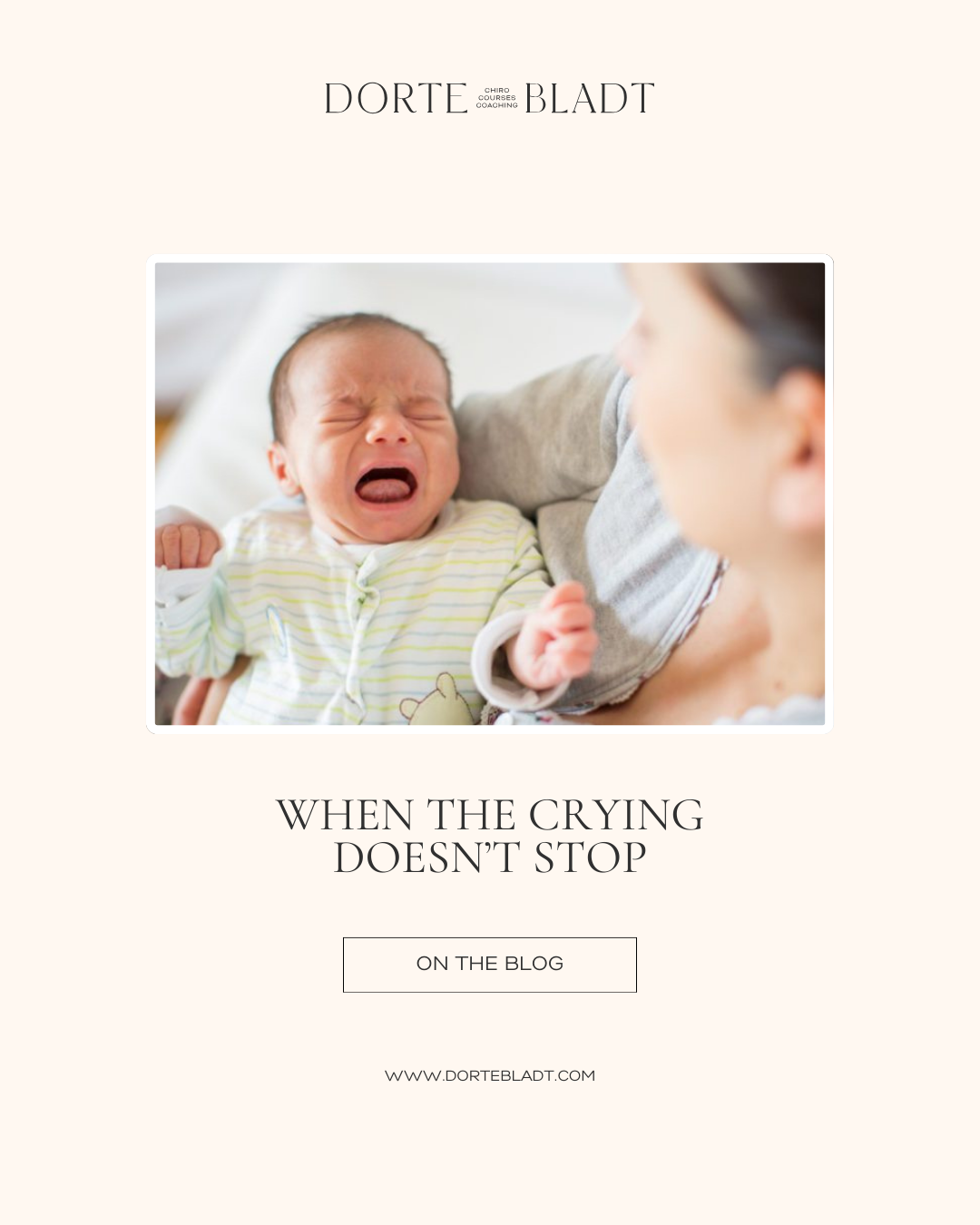When the crying doesn't stop
When the Crying Doesn’t Stop
A mum brings her baby into your office. Bubba is crying — really crying. Mum looks exhausted, anxious and wrung out. The little one is crying so loudly that you can’t help but wonder what people in the reception area are thinking…
What do you do?
Do you tell Mum that there’s limited high-quality research supporting chiropractic care for colicky or excessively crying infants — and reassure her that it will pass on its own in a few months?
Or do you gently check and adjust her baby, explaining what the parents can do at home to make baby more comfortable — and help them feel empowered and supported through this tough time?
Evidence and Experience
I’m dedicated to evidence-based care. It’s vital that we provide the most up-to-date, well-informed care for every person we see.
But when it comes to colic, I find it challenging to reconcile what the research concludes with what I consistently experience in practice.
Yes — the quality of the research into chiropractic care for colic is poor. But how do we dismiss care as “ineffective” when meta-analyses (of those very studies) show an average reduction in crying time of 1.27 hours per day?
Perhaps the problem isn’t the care — but that colic itself has many contributing factors. Researchers speculate about gastrointestinal dysfunction, immune challenges, hormonal imbalances, migraines, brain and nervous system function and more.
The Bigger Picture
As practitioners, we know that telling parents “It will go away by four months” isn’t enough. Increasingly, studies show that excessive crying in infancy can be linked to long-term challenges such as anxiety, depression, ADHD, migraines, irritable bowel, sensory processing difficulties, sleep disturbances and behavioural issues — all of which are skyrocketing in our society.
So, is colic causing these issues, or is it an early symptom of challenges that will manifest later? Either way, helping that developing system function better seems a wise and compassionate choice.
What Else Is Out There?
Realistically, there aren’t many effective alternatives.
Medications are often ineffective and/or carry serious risks.
Colic is not silent reflux — and PPIs are not appropriate for infants.
Elimination diets, lactase supplementation and massage offer inconsistent results.
Probiotics sometimes help, but evidence is mixed.
The strongest recommendation currently? Counselling parents — helping them understand that the crying isn’t their fault, and guiding them to reduce stress and anxiety.
And that’s something we chiropractors do exceptionally well.
The Chiropractic Edge
We as a profession are empathetic, kind and caring people who have often dealt with crying babies. We have – in addition to our gentle chiropractic adjustment techniques modified to suit the age and the size of a little person - lots of thoughtful and well trialled advice on feeding positions, latching techniques, burping ideas, as well as how to hold, carry and support for optimum comfort. We know which probiotics work best, which formulas to try and how to stimulate baby to pass wind. And, as we saw confirmed in the Safer Care Victoria review, we are probably the safest option of care available.
Want to Deepen Your Confidence and Clinical Clarity?
Going back to my original question: I hope that you would accept this sad little being for care. And if you feel you might not be totally up to scratch with these little ones, you should consider updating your knowledge and skills. Join my Masterclass on Colic to learn the latest insights into caring for colicky, unsettled infants.
This 3-hour CPD course dives into:
Causes and mechanisms of excessive crying
Chiropractic assessment and adjustment approaches
Practical, evidence-informed parental guidance
Help infants be more comfortable, their families feel seen, supported and hopeful — and become the go-to chiropractor in your community for colicky babies.
Learn more and register here https://www.dortebladt.com/courses/colic-masterclass
With love and respect,
Dorte Bladt DC
Champion for Kids’ Health
REFERENCES
Carnes D, Plunkett A, Ellwood J, et al. Manual therapy for unsettled, distressed and excessively crying infants: a systematic review and meta-analyses. BMJ Open 2018;8:e019040.
Maladkar et al, International Journal of Pediatrics and Neonatology 2025; 7(1): 90-93
Sarasu et al, Infantile Colic: An Update, Indian Pediatrics Nov 2018
Galling B, Brauer H, Struck P, Krogmann A, Gross-Hemmi M, Prehn-Kristensen A and Mudra S (2023) The impact of crying, sleeping, and eating problems in infants on childhood behavioral outcomes: A meta-analysis. Front. Child Adolesc. Psychiatry 1:1099406
Cook F, Giallo R, Hiscock H, et al. Infant Regulation and Child Mental Health Concerns: A Longitudinal Study. Pediatrics. 2019;143(3):e20180977
Ju Hee Kim et al., Infantile Colic and the Subsequent Development of the Irritable Bowel Syndrome J Neurogastroenterol Motil 2022;28:618-629
Romanello et al., Association Between Childhood Migraine and History of Infantile Colic JAMA 2013


